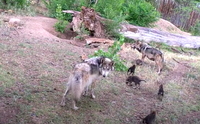ABQ BioPark Welcomes 7 Baby Lobos
June 9, 2020 - There are some new baby lobos roaming the Zoo this spring!
Mexican gray wolves Kawi and Ryder welcomed their second litter—with a whopping seven pups—in May, and the babies recently came out of their underground den for the first time to explore their environment a bit more.
Kawi is being a protective mom and animal care staff members have only been able to view the pups by camera trap video so far. A date is not yet set for their first exam, but sexes will be determined at that time.
The pups will join the growing wolf pack, which includes their parents and big brother Archer, who was born last May along with two siblings that did not survive. Mortality is often high in litters born to first time mothers like Kawi, and approximately 30 percent of Mexican wolf pups pass away by their first birthday.
Zoo Manager Lynn Tupa said second litters are generally larger, but staff was still surprised to see seven pups.
This birth is part of a cooperative breeding program between the Association of Zoos and Aquariums (AZA) Mexican Wolf Species Survival Plan and the U.S. Fish and Wildlife Service's (USFWS) Wolf Recovery Plan, which aims to restore Mexican wolves to their native southwest territory, including New Mexico. The BioPark has now welcomed 79 Mexican wolf pups since 1983.
The goal of the captive breeding program is to make the most genetically diverse matches to support the continued health of Mexican wolf populations in human care and the wild. Zoo populations like the wolves at the ABQ BioPark help support the ongoing genetic health of wild wolves.

